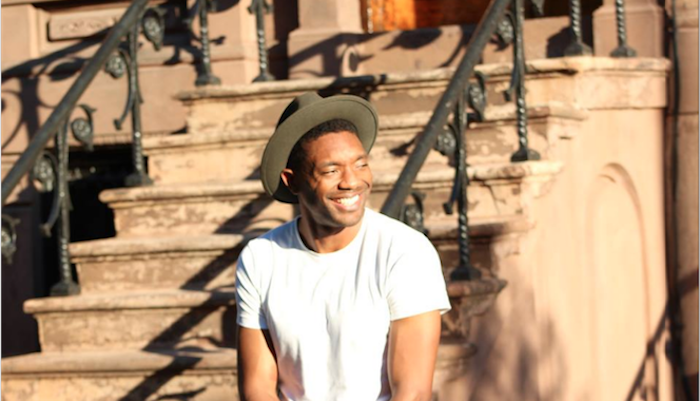Cyrus Aaron, playwright, poet and creative, has been making waves in the art world with his recent politically-charged spoken word performance during New York Fashion Week. Aaron collaborated with designer Kerby Jean-Raymond for his runway show titled “Money Problems,” a meditation on capitalism and inequality. Aaron’s work has rarely shied away from hard-to-swallow topics. Read our interview with him below to find out more about him, his work and his motivations.

Blavity: Tell us more about yourself. How has your upbringing shaped your creativity?
Cyrus Aaron: I am definitely my upbringing. I’m the only child from a single parent home, so we’re talking a lot of curiosity and an active imagination. You mix that with the culture of Chicago and you get a certain blend of discernment, compassion and creative zeal. I’m a storyteller, which transforms into plays, poetry, film, music–wherever there are words, so am I. I moved to New York City in 2010 to hone my voice and work toward a life of creating full time. Of course, early on, that meant getting a job, depending on my degree, and putting in work for someone else’s dream until I could afford to invest in my own. Last year I took the big leap from my safety net salary and trusted God’s timing.
B: What was your biggest takeaway from your collaboration with Kerby Jean-Raymond?
CA: Our existence and our livelihood depends on our ability and our desire to create and collaborate in black excellence. When we come together and we set individualism aside for community–and not uniformity, but community, where all parties have an active voice–the result is brilliant. “Bernie Vs. Bernie” doesn’t happen without Kerby’s commitment to the voice of the people.
B: Combining high-end fashion and political spoken word is very rare. Did you face any apprehensions or reservations before performing your piece?
CA: I wanted every second of it! It was left field for the audience, but it was necessary. The element of surprise can create the best stage; it brings out honest and raw emotions. After looking into Kerby’s previous shows centered around police brutality and depression, I knew he wouldn’t ask me to compromise the work or the opportunity.
B: “SOMEDAY” has received some of the most thoughtful critical acclaim. Tell us about why you chose to blend mediums of expression–dance, acting and spoken word–into one experience for the viewer?
CA: The psychology of black men is a deep space to enter–the same is true for our sisters, right? There are all these layers and textures to our journey that I didn’t think a singular story could balance. Even right now, my mind is flooded with Charlotte, Tulsa, Black Wall Street, legacy–it just keeps going– yet I’m still able to engage in this conversation. I didn’t want to limit the audience to one conversation or one form of expression. We are full of many sounds, expressions and movements that a vignette-style production made the most sense.
B: Tell us about the myriad of experiences that led you to writing and creating “SOMEDAY”
CA: Where do I begin? “SOMEDAY” is my life. There are several scenes that are inspired by my personal experiences, but I know I don’t own them. They are not mine exclusively. We have this cruel legacy of being able to say “we’ve all been there” to some pretty messed up situations. The events that made me stop everything and put this story into action were the deaths of Sandra Bland and Sam DuBose. It’s frustrating because a little over a year later, and it seems like we’re being slain in pairs like it’s a new trend. Seeing the dash cam video on Bland and then the body cam video on DuBose just overwhelmed me with pain. I knew I had to say something. I had to be a voice to reflect the times. Here we are again, weeks away from Opening Night, and we’re burying more black bodies in hashtags.
B: My personal belief is that creativity will lead to liberation, both of self and the collective. What are your thoughts on art as resistance, and how has creativity been a cathartic experience for you?
CA: I absolutely agree. We need liberation! I think we’re getting to the point where freedom doesn’t cut it anymore. We’ve been free since 1865 and yet black bodies are still being exploited and executed for public display. We’re still asking and demanding for equal protection, equal rights, equal pay, equal distribution, equal everything. In a civilized society, art is the most radical form of expression. Imagination is an identifier of liberation. The importance of supporting black creativity is vital. If systemic structures with biased agendas continue to control our narrative, then we can’t expect to experience liberation.
B: You don’t shy away from tough conversations or topics. Talk to us more about why, to you, confronting the uncomfortable is vital to impactful art.
CA: There’s an African proverb that says, “until the lions have their own historians, the history of the hunt will always glorify the hunter.” I carry this with me in every project that I approach. I write for the people. Our voices have been filtered for so long, I feel like I don’t have time not to address the uncomfortable. My mission is to tell my story, your story, our story. It’s my duty to embrace every aspect of our humanity, and create narrative with intention. I want to make people laugh just as much as I make people cry. Whether you’re reading my work in a book or you’re in the theater I want you to feel. I want you to see yourself. Even if my writing takes you to the place you don’t like to talk about, I want you to know I’ve already been there in order to make it easier for you. I write like home.

